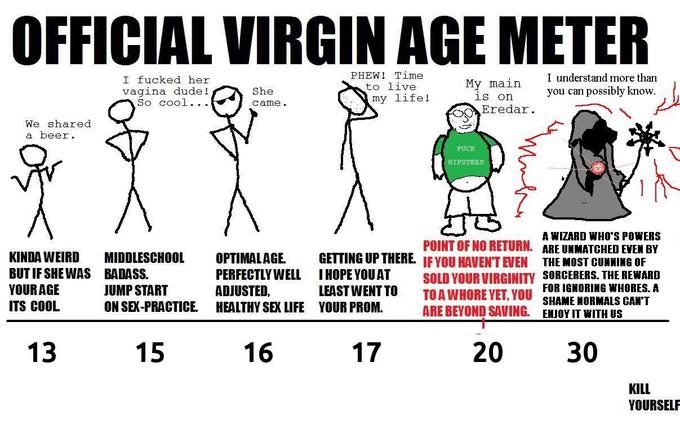We can begin, as most discussions of sex in America do, with data from the Kinsey Institute. The Kinsey Institute repurposes and discusses 2017 data from the CDC, which says the average age of first intercourse (more on what that means later) in men is 16.8, while women, on average, have intercourse for the first time at 17.2.
The Jacobs Institute of Womens Health corroborates this data, though it simplifies the number and says most Americans, as we did in the 1960s, first have sex around age 18. Unlike previous generations, however, we dont tend to marry the first person we have sex with, and we continue having sex at varying rates until our late twenties, when the majority of young Americans who get married decide to do so.
Of course, these statistics are based on a heteronormative (and many would say misogynist) definition of virginity. To solely define the loss of virginity in terms of whether you have penetrated someones vagina with your penis doesnt leave much room for those who dont want penetrative sex to describe or validate their experiences. Jacques Derrida called this phenomenon basing the entire worlds understanding of the human condition around the specific experiences of men phallogocentrism.
Though many organizations have tried in recent years to develop a more nuanced definition of virginity one that makes room for sexual behaviors which dont involve a penis no one definition has really taken root in the zeitgeist. Its difficult to get people of varying genders to agree on a definition when there are even inconsistencies across generations: In 1999, the Kinsey Institute reported that only a slight majority of Americans over the age of 60 believed sex using a condom counted as sex. That means, many Olds think you can go buck wild having hot not sex with whoever you want because the purpose of that activity isnt procreation. That explains why the casual sex rate at retirement homes is reportedly through the roof.
More confusing data emerged from that Kinsey Institute study: 11 percent of the survey respondents didnt consider an act sex if the man involved didnt have an orgasm. What was that term again? Oh yeah, phallogocentrism. Not only does a penis have to be involved in this instance for people to call it sex, but that penis has to ejaculate semen in order to earn its role in the proceedings.
Hanne Blank, author of Virgin: The Untouched History, told Broadly in 2016 that queer women tend to define the loss of virginity with whether one has experienced an orgasm with the help of a partner. It sucks to police the attempts of a marginalized group to define its own experience, but once orgasms are introduced into the virginity equation, things get even stickier. In 2014, the Journal of Sexual Medicine reported that less than 63 percent of women experience orgasms with familiar partners. Women having sex (of any definition) with new partners are far less likely to have an orgasm; the American Sociological Review reported in 2012 that less than 40 percent of women surveyed said they had an orgasm with their last casual sexual partner. If were searching for a way for women to define virginity loss without men, an orgasm isnt the place to hang our hats, either, simply because the female orgasm doesnt come as easily as the male one, even in loving, supportive situations.
In a hilariously titled project called the Had Sex Study in 2010, the Sexual Health journal found that 45 percent of people surveyed considered any manual-genital manipulation to be sex (though even the definition of manipulation is up in the air if you smack someone in the balls with your hand, is that sex? if you shake someones penis once, firmly, like a handshake, is that sex, or are we going with a Good Charlotte definition? 71 percent of people surveyed called oral sex sex, and only 81 percent of people thought anal sex was sex, which means 19 percent of the survey respondents think all gay men are virgins.
In 2015, a study by San Diego State University determined that Generation X and Baby Boomers tended to cram in more sexual partners before getting married at an earlier age than millennials do, although the millennial generation doesnt tend to put the same constraints on itself as far as young marriage. Perhaps because earlier generations felt pressure to get married as soon as possible, they auditioned a bunch of candidates (10-11 on average) before settling down with one in their early 20s. Because the average age of virginity loss has pretty much stayed the same across generations (17-18), that means our parents and grandparents were fucking around like rabbits for three or so years before cooling off, whereas, on average, we tend to take our time committing to anyone, and we have a whole lot of casual sexual activity, which many of us are hesitant to call sex at all.
https://www.inverse.com/article/32446-sex-first-time-virginity-age
On a related note, Slate has calculators to let you know if your number of sexual partners is above average, and whether you have sex as often as your peers do.
On an unrelated note, Luke Skywalker Is Definitely a Virgin, and Heres Why





